Backpacking Africa: 39 Things You Need To Know Before You Go
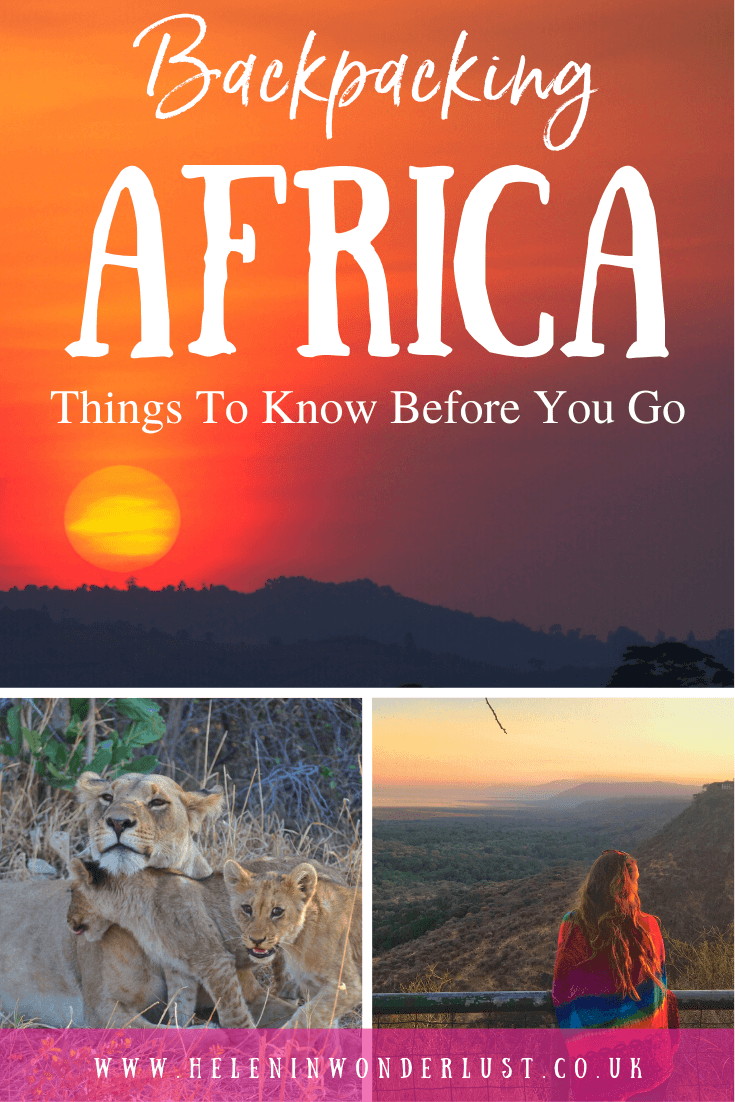
So you’re planning (or are thinking about) backpacking Africa! Yay! Well, you’ve come to the right place!
A lot of people think you need to take an expensive safari trip to travel to Africa, but I’m here to tell you that you don’t. Safaris and big bucket list experiences are only a tiny part of what Africa is and contrary to popular belief, it’s an amazing place for an independent traveller.
Backpacking (and flashpacking) in Africa has been a huge part of my life for the last 11 years now – taking local transport, hanging out with local people and going on adventures – this is one of my favourite ways to travel.
Travelling is this way allows you the freedom to immerse yourself in the local culture in a way that you wouldn’t get to otherwise.
But travelling solo isn’t always easy, which why I created my own backpacking tour company, which offers immersive, authentic and life-changing experiences in Africa. Although I’d probably call what we do flashpacking, as we do have a few luxuries… like private transport (most of the time, we also do take public transport) and private rooms, rather than dorms – basically the best of both worlds. If you want to see more, check out this video.
Either way, whether you are planning to travel solo or coming on a Rock My Adventure tour, I wanted to share with you a few things you need to know before backpacking Africa!
Backpacking Africa: 39 Things You Need To Know Before You Go
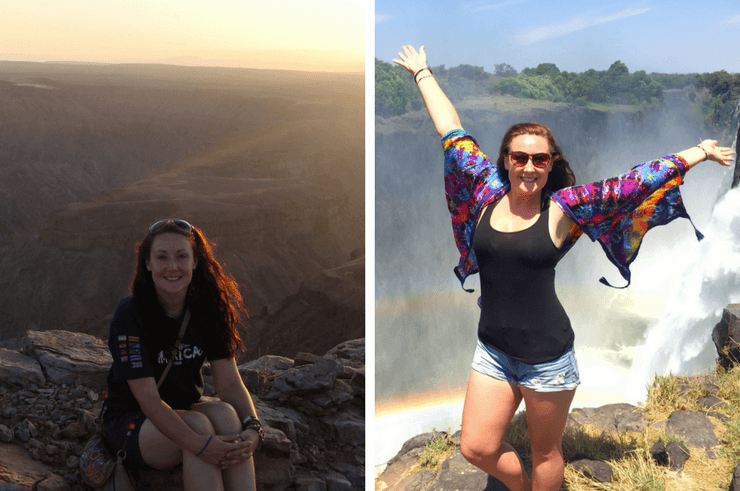
Africa Travel is Highly Addictive
Pretty much everyone I know who goes to Africa gets addicted. This continent gets under your skin and into your blood like no other.
Just look what happened to me! Within 5 minutes of landing in Zambia, that was it. I was a gonner.
It’s very likely that you will fall in love and life will never quite be the same again. After you return home from Africa, you’ll long to return, again and again. Prepare yourself!
Driving Distances Are Long & Everything Takes Time
Africa is a big old continent and many of the main highlights are spread out, so prepare yourself for the fact that you’re going to spend a considerable amount of time moving from place to place. But just remember that it is all part of the experience and (try to) enjoy it! Those long bus journeys will make the best stories.
Even when the distance isn’t long it can still take much longer than you expect to travel anywhere, either because the bus is waiting to fill up, or it stops every 5 minutes or because the roads are bad, so always leave yourself a good amount of time to get anywhere, leave as early in the morning as you can and try to travel by day where possible as driving at night can be dangerous (people/animals on the road, dodgy drivers or bandits).
Oh, and if you’re crossing borders, don’t forget to leave time to do so. Sometimes it can take a while.
You’re Going to Be Uncomfortable
If you travel cheaply ie. by public transport, you’ll have to get over the fact that (at times) you’ll be:
- on bumpy roads
- squashed in an uncomfortable position with too many people for way too long
- too hot
- too cold
- windblown (from the person in front not wanting to shut their window)
- needing a wee
- hungry
- feeling sick
- covered in sardines (yes this happened to me once)
- all of the above
Don’t get me wrong, there are lots of nice forms of transport in Africa, but when you’re on a backpackers budget, the times you get to take those will be few and far between.
I love those long bus rides and crazy ferry journeys (usually more so in retrospect) or hitching a ride up a mountain in the back of a pickup truck with 12 other people squished in and I’d say that 80% of the time I’m backpacking in Africa (and I mean physically travelling between destinations), I’m uncomfortable.
To me that’s Africa, and it’s all part of the experience. Live in the moment – it will never come again. The journey is the destination.
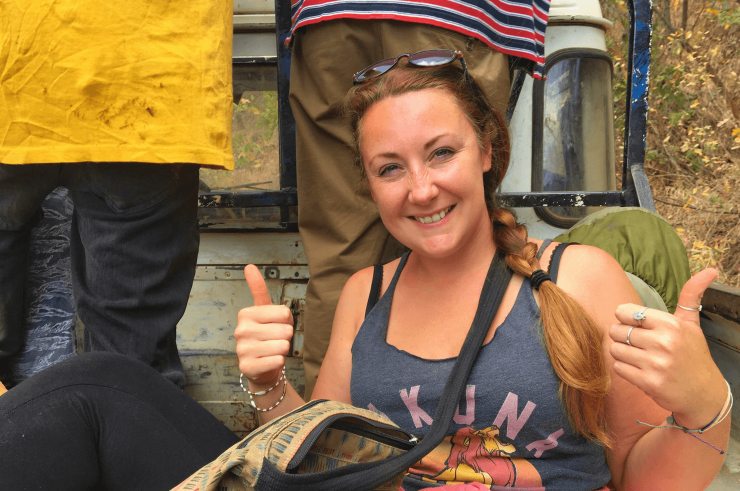
Get Ready for the African Massage
Sadly this is not as delightful as it sounds!
I was on a bus a few weeks ago. My friend Melissa and I had just finished my Tanzania & Zanzibar group tour and we were heading from Dar es Salaam to the Tanzanian/Malawian border at Kyela. The road was the bumpiest road I’ve ever been on, the bus suspension wasn’t great and I thought my intestines were going to come out of my mouth.
This is known as the ‘African Massage’. It was also hilarious. It’s about how you look at it.
The roads are definitely improving in Africa, especially along the trade routes, however, there’s still a long way to go. Even the road to the Masai Mara is pretty crappy, which you would think they’d sort out – but no! UPDATE: This road has vastly improved as of 2020.
Protect Yourself from the Dust, the Damn Dust
The reason that so many of the roads are bad is because they’re not tarmacked. And when it rains, they wash away. When it doesn’t rain, the dust is going to be all over your clothes, in your stuff, up your nose, in your ears, in your hair and your eyes!
If you have electronic equipment such as laptops or cameras, you need to protect them with good cases. Your clothes will also get covered in dust too, so I’d advise not to bring any white or light coloured items that you don’t want to turn a nice shade of orange brown. Obviously you can bring some nice stuff to wear for in the cities and on the beaches, but in the villages, on safari and when you’re travelling, but only bring clothes that you don’t mind getting dirty.
Wear sunglasses to keep the dust and grit out of your eyes and take eye drops to keep your eyes from getting too sore. Having a scarf or buff on hand is also great for covering your nose and mouth when you need too and to keep your hair dust-free.
For the rest, I advise that you carry baby wipes to keep yourself clean.
Which brings me onto my next point…
Your Skin, Hair, Hands and Feet Will Be a Mess
When I’m backpacking in Africa long-term, if I’m not careful, I can look like I’ve been dragged through a hedge backwards and then trampled by an elephant.
My skin gets really dry and covered in nasty red mosquito bites, my hair turns into straw, my heels crack and my toes get scuffed from wearing flip flops, I’m covered in bruises from lugging my backpack and getting bumped around on transport and you don’t even want to know what state my nails are in most of the time! Sounds great, doesn’t it?
A good moisturiser (for face/feet) and sunblock is essential! As is a nail brush (see below)! Keeping your hair covered on safari really helps to stop you looking like a scarecrow. Anti-itch bite cream is a lifesaver. The rest of my essentials you can see below.
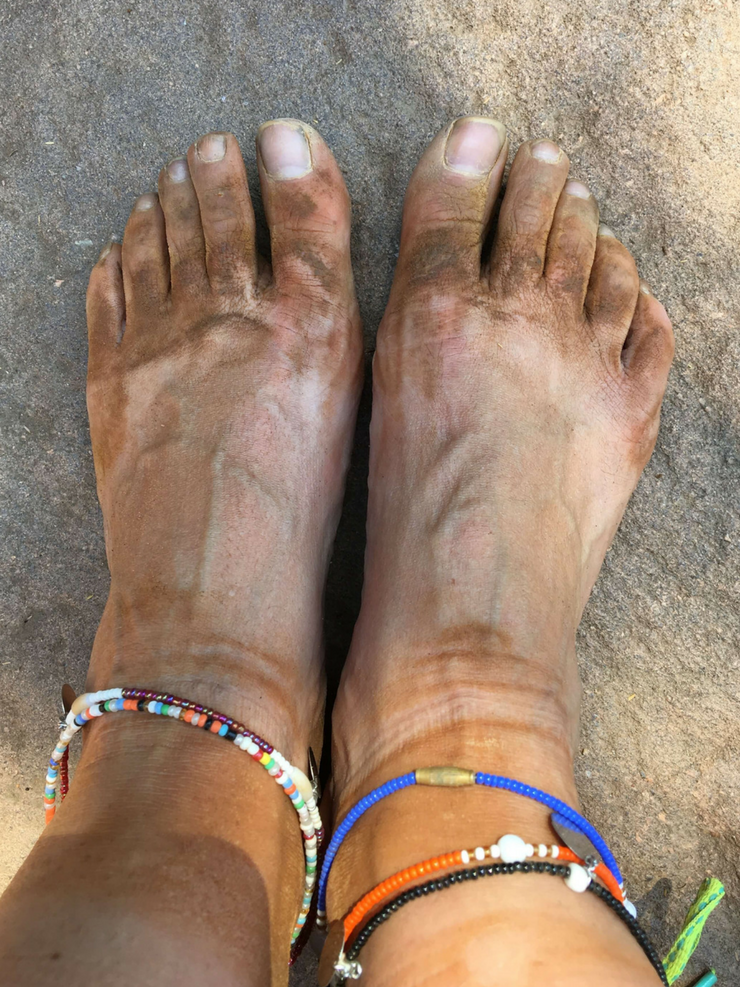
Get on Africa Time… Quickly
Have you heard about Africa Time?
Africans tend to have a much more relaxed attitude to time than in other parts of the world. There is no sense of urgency. Nobody stresses. Hakuna matata my dear friends.
It happens when it happens.
It’s probably one of the most frustrating things you’ll need to overcome whilst travelling in Africa and one of the best things you’ll learn.
Of course, some things happen on time, I mean don’t rock up for your bus an hour late and expect it to still be there, but also don’t expect it to leave on time either.
You’ll be in the queue for something and it’s your turn. No-one is in a rush to serve you. They’re talking, looking at the computer screen, on their phone, writing something and you’re like “Why is everyone ignoring me?????” 5 minutes later…
You got somewhere to be? Then you’d best leave a day earlier just in case. A perfect example would be the Tazara Train I took from Zambia to Tanzania. It arrived 24 hours late. Had I been trying to get on a flight, I would have been screwed. Luckily I wasn’t and I just went with it!
A few weeks ago, I was at the dowry celebration for the daughter of the Chief of Livingstonia. That whole day was amazing in itself, but maybe a story for another time.
To get to the celebration, we’d had to walk up to Livingstonia (a town on a mountain top) from where we were and down the other side. It had probably taken us an hour and a half or so.
When we arrived, we were debating what time we needed to leave so that we could walk home before it got dark.
“Don’t worry, we’ll take the short cut”, said my friend Junior, brother to the Chief, “it takes an hour and some minutes.”
Great a short cut… so we left about an hour before it got dark.
Well, it turned out that “an hour and some minutes” was 3 hours. So we spent the last 2 hours walking around a mountain, in the pitch black, no street lights. Luckily Junior was with us, otherwise, I’d still probably be on that mountain somewhere.
At the time, those 3 hours were PAIN-FUL. Now… it’s one of my favourite ’round the campfire’ stories to tell.
The sooner you can get on Africa time, the sooner you’ll get into your rhythm.
Always Carry These Essentials in Your Day Bag
As well as the usual things like your passport and cash, there are a few things I always carry in my day bag.
- Toilet Paper: You never know if there will be loo roll, so always bring your own.
- Sanitary Products/Diva Cup: If you’re caught short on a long journey, the likelihood of being able to find tampons or even sanitary towels is remote and I doubt you’d be able to get any from your main bag, so keep an emergency stash in your handbag.
- Hand Sanitiser: Washing your hands isn’t always an option so having sanitiser in your bag is really handy – excuse the pun.
- Eye Drops: My eyes get really sore from all the dust.
- Lip Balm: As above! I usually use Dr. PAWPAW Original Balm as it’s pretty multipurpose.
- Wet Wipes: You won’t even realise how dirty you are until you give your face a wipe. Ugh!
- Small Change: Some of the toilets charge for use, so it’s always good to have small change, although it’s not always easy to come by.
- Phone Charger: Keep it on you and charge every chance you get.
- Powerbank: When your phone runs out of batteries on a long journey and you need to sort your life out, you’ll be very glad of that extra power bank. Just remember to charge it!
- Head Torch: One of my most treasured possessions when in Africa! Great for dorms, camping, power cuts and just generally poor lighting. I keep it in my day bag now for emergencies (after the Livingstonia incident above).
- Insect Repellent: Mosquitos love hovering around in a bus. I love a brand called Peaceful Sleep, which I’ve only seen in Southern Africa. It smells really nice.
- Sunglasses: Sunglasses are multipurpose in Africa – they shade you from the sun, protect you from the dust and cover up your face when you are looking rough as anything because you went out partying last night before deciding to take a 10 hour bus ride!
- Entertainment: African bus companies have a horrible habit of either playing really crap movies or really crap music on repeat – really loudly. If you want to drown it out, make sure you have something else to keep you occupied.
- Water: Keep yourself hydrated people.
- Food: If you’re travelling by public transport, you’ll often be able to buy things like fruit, nuts, samosas, chips as you go, but just in case, maybe have a little snack in your bag for emergencies.
- Scarf: For keeping you covered when you need it (from the sun, to be culturally appropriate) or to shield you from the dust.
- Medication: I usually carry my malaria tablets, Immodium (just in case) and some painkillers in my bag.
It Can Get Really Cold
People don’t always believe me when I say that Africa gets really cold but Africa is a huge and diverse place with many microclimates, so the chances are that if you are travelling around to different places, you’re going to experience lots of different temperatures and weather conditions, so you need to be prepared.
I see lots of people rocking up in Africa with just a denim jacket. No. This is not going to cut it most of the time. Some areas are always hot, yes, but lots aren’t, so make sure to do your research before you arrive.
If you’re backpacking and/or going on safari, you will be spending a lot of time outdoors too and once that sun goes down, the temperature can really drop, so having a lightweight, down jacket in your bag can be a real lifesaver.
Honestly, just trust me on this one!
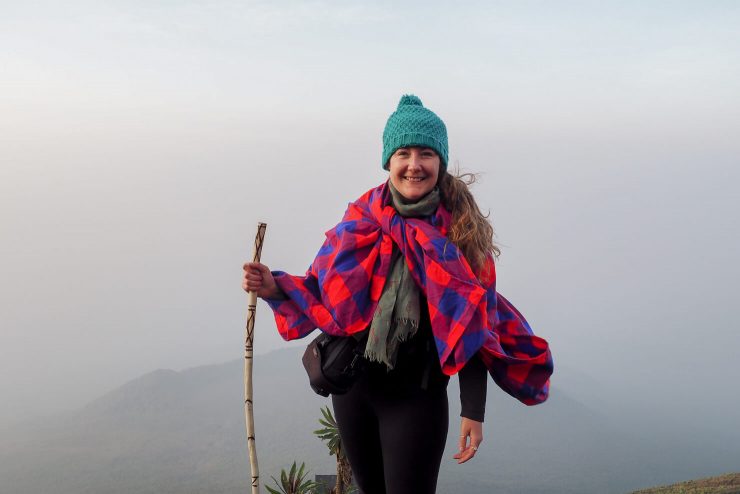
You Will Have Some Lonely Days
I’ve had some of the best times of my life whilst backpacking Africa. I’ve also had some of my loneliest moments too – and I’m a pretty confident, outgoing, extroverted person – which may actually make things worse!
There just isn’t the volume of travellers that you find in other popular backpacking destinations, so whilst you will almost definitely meet people in hostels etc, it may not be every day and even when you do, you may not be on the same itinerary. If you are flexible, it definitely helps, but that’s not always possible, especially if you have specific places you want to go or activities pre-booked.
Be prepared for the fact that you may get an odd day or two where you don’t meet many people. Sometimes, you really need to make an effort. If you see people in the hostel, go and talk to them. Rarely will anyone not want to talk to you. And there’s always the bar/hostel staff who are usually happy to chat to you!
Saying all that, I actually think that you tend to get a much more awesome crowd backpacking Africa than anywhere else I’ve been, so in some ways, it’s actually easier to make ‘real’ friends, so you feel less lonely generally. Yes, you will have the odd lonely day, but they will pass and it’s gonna be awesome.
But You Are Not Alone
There’s an awesome group on Facebook called ‘Backpacking Africa‘ which is really helpful for those wanting to travel through the continent. It’s great for finding travel buddies and asking questions of people who’ve been there and done that! I’m one of the admins and very active in the group too!
If you don’t fancy travelling solo, you can always come on one of my tours… 😉 If you’re undecided, in this post, I weigh up the pros and cons of taking a group tour vs travelling solo in Africa.
Location! Location! Location!
A good way to avoid the loneliness is to stay in the right places. Where you stay when backpacking in Africa can really make or break your trip.
If you’re looking for a really local experience, consider couchsurfing, which is becoming increasingly popular with lots of backpackers. Me personally? I usually stay in either backpacker hostels or backpacker/overlander campsites.
When picking a place to stay you want to find a camp or backpackers that a) is in a good location and b) has good vibes. And if you’re looking to make friends, one with a good communal space.
Staying in a place with great staff and owners is often invaluable as they are an amazing source of information.
Ask other backpackers for recommendations as you go, or check out my Africa Travel Resources page! I’ve stayed in many of the best backpacker hostels in East and Southern Africa (I’ve also stayed in some of the worst) and this is where I pretty much list all of my favourite backpacker hostels and camps on the continent. I’ll keep adding to this list as I go.
Also, have a read of my post where I list the best places in Africa for solo travellers.
In Busy Season, Book Ahead
Good backpacker places in Africa are few and far between and there only tends to be one or two great ones in any given location.
Some places need to be booked in advance, some you can just turn up. It can also depend on the season. In high season, the really popular places can book out so it’s good to give them a call before you turn up, even if it’s just a day or two ahead.
Nothing worse than arriving and there’s no space for you. Especially when it’s a right mission to get there!
Let’s Talk About the Toilets
Someone recently told me that the thing they were most unprepared for was the toilets, so here goes. Let me prepare you.
Toilets in Africa can generally come in 5 forms. If you’re backpacking, you’re likely to use all 5 (maybe less so if you’re on a luxury, all-inclusive kind of trip).
- Western-Style: Toilets that you probably have at home. Some flush, some don’t and have a bucket of water next to them for flushing. Just pour it down and what’s in there should disappear.
- Flushing Squat: Ceramic squat toilet. Again, some have a flush, some don’t. It they aren’t the flushing type, they’ll probably have a bucket of water that you can use for flushing. Most of the service stations have these but they vary in standard!
- Hole in the Ground: This is usually a long drop squat toilet in an outhouse. The state of these vary greatly. Some smell, some don’t – depends on how full they are. You find these more in rural areas but sometimes in towns too, especially in petrol stations/schools.
- Compost Toilet: A long drop toilet, but seated rather than squat. You do your business, then if it’s yellow, let it mellow, if it’s brown… take some sawdust from the bucket next to the loo, cover-up it up, close the lid and be on your merry way. Usually found at eco-lodges.
- Bush Toilet: Find a bush, squat behind it and do your business. Usually found on safari or long overland journeys. Don’t leave your toilet paper lying around. Firstly. Make sure it’s bio-degradable and then you can either, bury it or take it with you (in a biodegradable bag).
I have a few tips for dealing with the toilets in My Top Africa Travel Tips post!
When The Bus Stops… Pee Quick
So you’re on a long, bumpy (of course) bus ride. Most buses only stop once on a 8 hour or so journey. Some of the bigger, better coaches have toilets and some don’t.
If it doesn’t, by the time the bus stops, you’ll probably need to a) pee or b) eat.
But no-one ever tells you how long you have when the bus stops. The locals all just seem to know, so you should always ask the driver or conductor how long you have. Because it can vary from a couple of minutes to half an hour.
Or, if they don’t speak English, try asking someone else on the bus or keep a close eye on your fellow passengers.
My best advice – pee first, eat later. If you followed my advice above and brought some snacks, you’ll be good to go. Oh, and always make sure you take your own loo roll.
When you hear the bus beeping and revving, get back there asap as it’s about to leave.
Appreciate Hot Showers
Hot showers whilst you’re backpacking in Africa (especially East Africa) are few and far between and I can’t tell you how many times I’ve been mid-shower and the water has disappeared!
Having a cold shower is not so bad when you’re in a really hot place, but when you’re not it’s pretty grim, so the sooner you learn to shower quick and tolerate cold water the better! If you can’t do without hot water, most places will warm some up if you ask them.
If the water is cold, the trick is to wash your hair first (keeping your body as dry as possible) and then wash your body after!
The other thing to keep in mind is that fact that you are lucky enough to have water, as a lot of people don’t even have proper access to water, let alone hot water for showering. Having this in the back of my mind always, makes me a lot more tolerant.
The WiFi is Sketchy
Back when I started travelling Africa in 2009, there wasn’t much WiFi at all. Most of my internet time consisted of finding an Internet cafe or waiting for the one computer that the hostel had.
Now, most backpacker places have WiFi – which I find to be great and awful at the same time. I miss the days when everybody actually spoke to each other instead of staring at their phone/laptop (yes, I’m old).
However, I’d say 50% of the backpacker places that I stay, still have dodgy WiFi that is ether super slow or doesn’t work much at all.
But mobile phone networks are generally pretty good these days. In more remote places, the internet doesn’t always work, but for the most part, it’s often easier to get your own data, rather than relying on the hostel.
You will need to get a new SIM card for each country you visit, even if it’s the same provider. SIM cards can be picked up easily in every town, some require a passport for registration.
Just be prepared for the fact that you can’t always rely on the internet, so you may want to let loved ones know this. I would often take screenshots or write down numbers I needed as I didn’t want to rely on Google.
But you know what? Not having internet, as frustrating as it is, is also super liberating and means that people actually talk in hostels!
You Will Stand Out
As a traveller, unless you’re in a cosmopolitan city such as Nairobi, you’re going to stand out. People will stare. They will be curious about you. I can’t even tell you how many times young children have screamed in my face because they were terrified of me or won’t leave me alone because they find me fascinating.
You’ll often hear the word ‘mzungu’ (or the local equivalent) uttered in your presence and you know people are talking about you. Mzungu means ‘foreigner’. Kids will shout mzungu at you often. They’re usually very excited to see you.
As much as you try to blend in, you’re going to stand out as a tourist. You just need to roll with it and accept that is the way it is.
I just try to show people that we aren’t so different in the best way I know how – I travel on local transport, I hang out with local people, I eat in local restaurants and I write this blog to show other people how they can do it too.
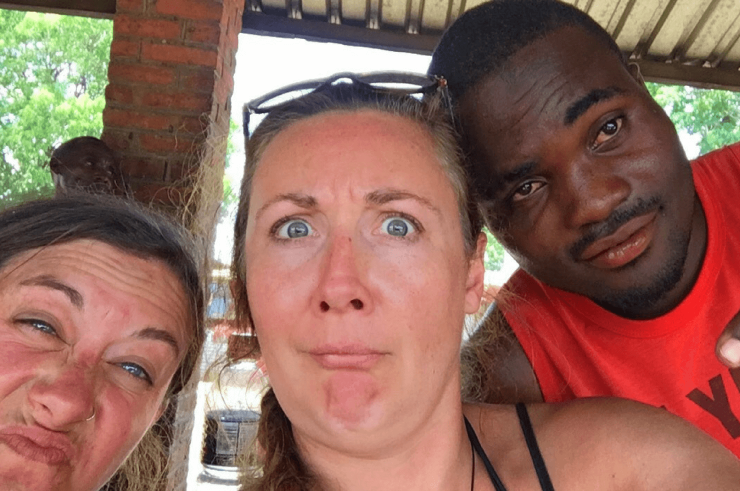
Be Prepared for Unwanted Attention
“I like you, I love you”, the man I’d never met before said, staring at me longingly through the front window of the minibus I was sitting in – much to the amusement of the rest of the bus. “Thanks, I love me too!” I said. He continued to stare for a few more seconds before walking away. 10 minutes later, he’s back. He declares his love again.
“Hey, are you on Facebook? Can I take your WhatsApp? I want to keep in contact with you” said the drunk guy who sat down (uninvited) whilst my friend and I were having lunch at the bus station.
“I want to give you a baby” said the man to my friend. We’d just asked him where we needed to go to get the bus after crossing the border from Tanzania to Malawi. This was not the first time either of us had been offered a baby on this trip.
I’m at the club, I turn around and some guy is grinding right behind me. I move. He follows me. I move again. He follows me. I switch places with my male friend. He grinds behind him too.
As sad as it is to say, a lot of guys want a Western girlfriend/sugar mama so if you’re a woman travelling alone, with a friend or even in a group, you are likely to attract a large number of men. Don’t get me wrong, there are some really nice, genuine guys, but the majority of the ones (if not all) who come onto you like the examples above are not the genuine ones.
It’s usually harmless and can be quite funny and I’ve never felt threatened, but it can be very irritating and tiresome. For the record, dressing conservatively or looking like crap after a 28 hour ferry ride makes absolutely no difference.
If you feel uncomfortable, be firm but polite and tell them to get lost. Wearing a wedding ring (fake or not) or mentioning your boyfriend/husband is usually enough to make any guy leave you alone. Whatever you do, don’t give out your number to any randoms!
People Will Assume You Are Rich
As a traveller, most people assume that you are rich and so it’s common to be overcharged or taken advantage of. And by most standards, you are quite rich if you are able to travel in Africa.
But that doesn’t mean you need to get ripped off constantly, so here are a few ways to avoid it.
This is a very general backpacking rule, but always a good idea to agree the price for anything before you commit to avoid any arguments at the end.
I often ask local friends or the places where I’m staying how much this or that costs so that I’m not massively overcharged. I know that I’ll end up paying a little bit more sometimes – ‘Mzungu Prices’ – but I don’t want to pay massively over the going rate, if at all.
Street vendors pull at your heartstrings to get you to buy something. Put yourself in their shoes, life is tough and they’re just trying to make a living. But don’t feel you have to buy something. You’ll soon be out of money if you bought everything from everyone who gave you the hard sell. Learn the words for “No thank you” or, “I don’t need it” as quickly as you can.
Don’t Give To Kids Who Beg
Almost everywhere you go, the kids ask for sweets, money, pens…
“Mzungu, mzungu, give me my money/pen/sweets!”
I fundamentally disagree with giving kids who beg for money. This just teaches them to beg instead of going to school and learning the vital skills that can help them achieve the life they aspire to. You also don’t know if someone else is putting them up to it – whether that be a parent or something more sinister.
Recently I waved at a kid whilst on the bus and her parents gestured for her to run over to us, which she did. Upon reaching us, she immediately put out her hand for money. We said no and she looked totally embarrassed and I was so angry at her parents right then. What are they teaching this poor kid?
Sweets is a difficult one. I know a lot of people do this, but I don’t agree with this either. Most of the parents would probably say it’s ok, but I think it’s weird giving sweets to random kids. You wouldn’t do it at home, would you? It’s not good for their teeth and it’s similar to the money thing. It’s teaching kids to beg for stuff.
If you want to give the kids something, make it an empty water bottle, or even a full one, or something for school – although I would advise giving clothes, pens or books through a proper program so you don’t cause jealousy.
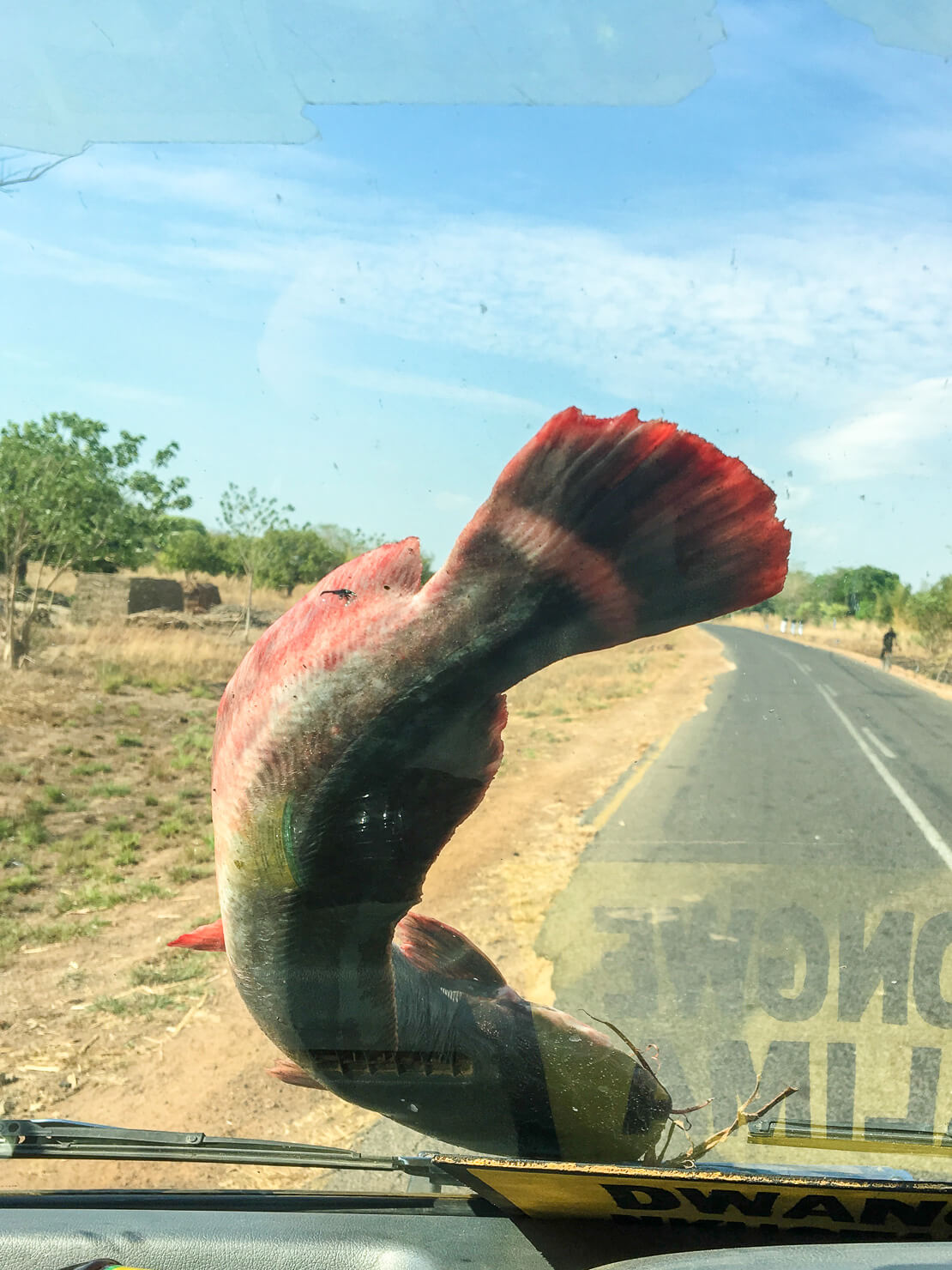
Have Patience (and a Sense of Humour)
Africa can be an incredibly frustrating place to travel for many of the reasons mentioned above.
There’s a famous saying – TIA or this is Africa! It’s the phrase used when things go wrong. Or when things don’t work, or when weird stuff happens.
Like the other day when I was sat in the front seat of a public minibus and a huge great catfish slapped onto the window. I almost jumped through the roof. It had been tied to the windscreen wipers to be transported, unbeknownst to me.
I spend half my time in Africa confused by the way people do things. There is a severe lack of infrastructure and I think ‘organised chaos’ would be the correct expression for what you will experience.
But getting angry, upset or frustrated really isn’t going to help. The more that you can see all of the frustrations as ‘part of the experience’, the more you’re going to love it.
Embrace the chaos, embrace the weirdness, embrace the amazingness, embrace the experience – THIS IS AFRICA.
Greetings Are Very Important
Greetings are super important in Africa.
Before you launch into anything, don’t forget to say “Hello” and ask “How are you?” To which the response will always be “I’m fine”. If you can do it in the local language, even better!
This will always set you on a good footing with whoever you are talking to and I reckon it’s one of the reasons I do so well when travelling around Africa. Handshakes are also very important too.
Learning a Few Local Words is Invaluable
Following on from the above, If you can learn a few learn a few words in the local language, it will really help you. Just be aware that the local language in one part of the country is probably not the same as another part of the country as almost all countries have multiple languages, but there’s usually a main language and people will generally appreciate your efforts.
An example of this would be Chichewa in Malawi. Malawi has a number of different tribal languages, however Chichewa is the most prevalent one and most people will at least understand the basics.
The best words to learn are:
- Hello.
- How are you?
- I’m fine/good.
- Thank you.
- You’re welcome.
- Goodbye.
- What is your name?
- My name is…
- No thank you or I don’t want.
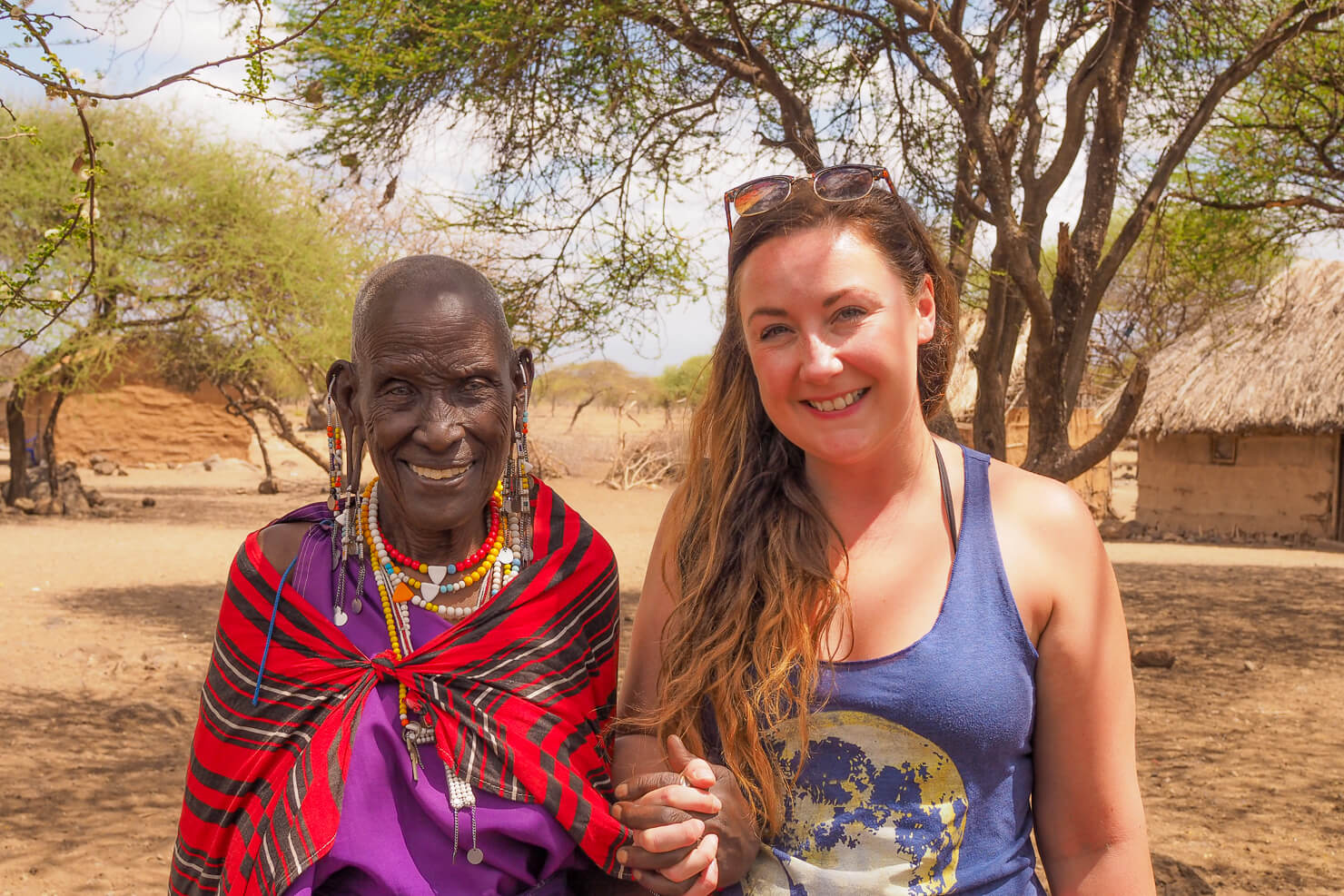
Don’t Be Afraid to Take Your Time
When you arrive somewhere new, bus station, ferry terminal, train station, you’re going to have the word “taxi, taxi, taxi” shouted in your face.
One person will tell you one thing, someone else will tell you something different. They’ll say the other is lying and a cheat.
Don’t be scared, people are just wanting your business, but it can come across as a little aggressive. Don’t be afraid to take your time. Move to the side, firmly tell people to give you a minute whilst you get your bearings.
If you need to, ask an impartial person for their advice – I usually ask a woman, a shopkeeper or someone who looks relatively sensible!
Don’t Get Upset If People Are ‘Rude’
In the parts of Africa I’ve been to, the word ‘please’ isn’t widely used. So what you’ll find, is that when someone says something in English, it can sound really rude.
For instance, if you are at passport control, you’ll never get a ‘Please can I have your passport”, it usually “Give me your passport”.
I’ve seen many a traveller get annoyed by the directness or ‘rudeness’ of a request, but don’t let it bother you. It’s really not personal 99% of the time.
Backpacking Africa is NOT Expensive
But activities and visas are!
If you take public transport, eat locally and stay in hostels, you can travel through Africa on the cheap, spending just a few dollars a day. But if you really want to see and do everything, get saving!
For an idea of how much you might spend in 6 months of backpacking, take a look at my 6-month Africa travel budget which I’ve updated to reflect 2020 prices. For the record, you could spend a lot more or less than I did, depending on how you travel, but this is how much everything cost me. At the very least it should give you something to base your budget on.
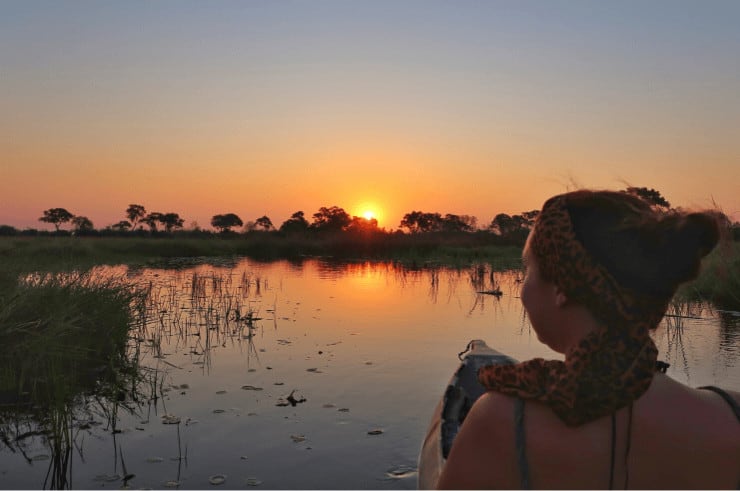
You’re Going to Need Some US Dollars or Euros
Whilst each country has its own currency, for most visas in East/Southern Africa, you need to pay in US Dollars. In West Africa, Euros tend to be the most widely accepted. You can also use US Dollars, Euros and often GBP to pay for a lot of activities.
You can get USD and Euros from some ATM’s, but they are few and far between, or you can change local currency for dollars however you’ll lose out on the exchange rate doing it this way. If you can though, I would try to anticipate the USD/Euros that you need and take them with you. At least have enough for your visas and a few spare. I explain more in this post.
Dollars should also be the newest ones you can find, ideally post 2013, as there are a lot of fakes circulating and some businesses won’t accept older ones. Although I personally haven’t had any dollars refused, even slightly older dated ones. If you get them from home and they are new and undamaged, you should be fine. But I definitely wouldn’t take any dated earlier than 2009.
2006 and earlier are rarely accepted.
Visa is More Widely Accepted Than Mastercard
Visa is much more widely accepted than Mastercard so make sure that you don’t just rely on that.
And don’t forget to let your bank know where you are going!
Don’t Believe Everything You Read
The media often makes Africa out to be this terrible place.
But Africa is a very big continent and the African places that you are likely to visit are probably very far removed from the Africa you see on the nightly news or in charity appeals.
That’s not to say there aren’t some dangers, of course, there are like there are anywhere, but generally speaking, Africa is a very safe place to travel (and a great place to travel solo) and what you see on the news should not put you off.
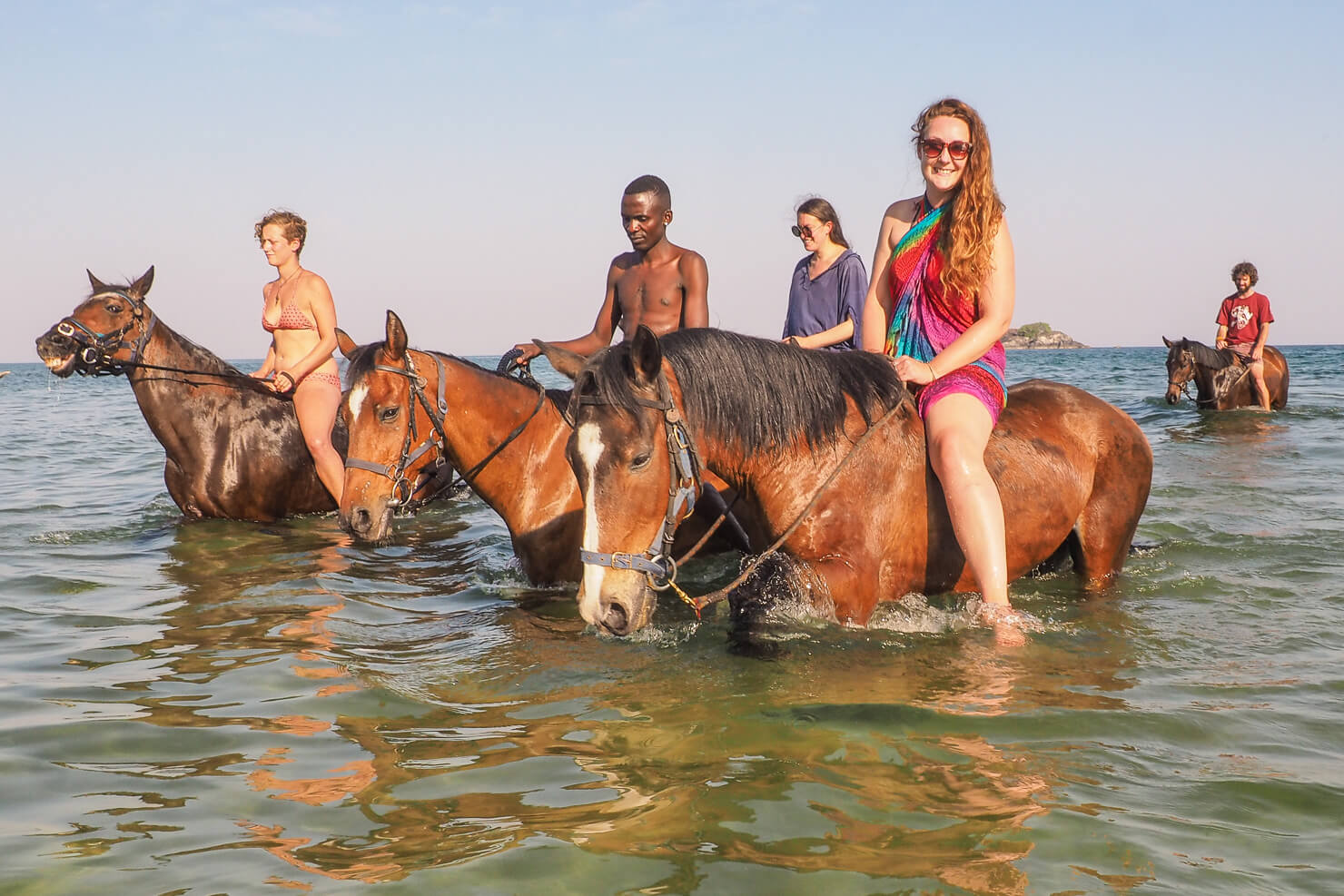
Check the Visa Requirements Before You Go
African countries can be pretty strict on visa requirements, so always make sure you check the requirements before you go. You’ll need to have your visa money (where needed) in the currency required, usually US Dollars in East and Southern Africa and some visas need to be obtained in advance.
You don’t want to be refused entry at the border or even worse, be turned away at the airport before you even board the plane. That would really suck!
Take Water Shoes
This is a weird one, but every time I go to Africa I’m like, damn, I didn’t bring any water shoes AGAIN! I love swimming in rivers and lakes and they’re always really rocky (as you would expect).
Last week I went swimming in the Devil’s Pool at Victoria Falls, which was amazing, but I had to wear my trainers. Not ideal!
If You Do Swim, Be Aware of Bilharzia
Bilharzia or Schistosomiasis is a parasitic infection caused by tiny worms that can get into your system if you come into contact with infected freshwater. If untreated over a long period of time it can cause damage to your vital organs.
You can get it from swimming or bathing in contaminated water. It is found in many parts of Africa include some parts of Lake Malawi and the River Nile. Some hostels and hotels places take water directly from the rivers and lakes. It is not passed from person to person.
It usually takes around 6 weeks for symptoms to start showing, but it can be earlier or much later.
But don’t worry, it’s easily treated if caught early and the tablets are available from pretty much any pharmacy in Africa and are really cheap, so it’s best to pick some up before you leave as it’s not as commonly known in Europe or the US. It’s the same medication you would take for a tapeworm. They usually weigh you to see how many tablets you need.
I’m currently taking medication for bilharzia now after swimming in Lake Malawi and the River Nile. Better safe than sorry!
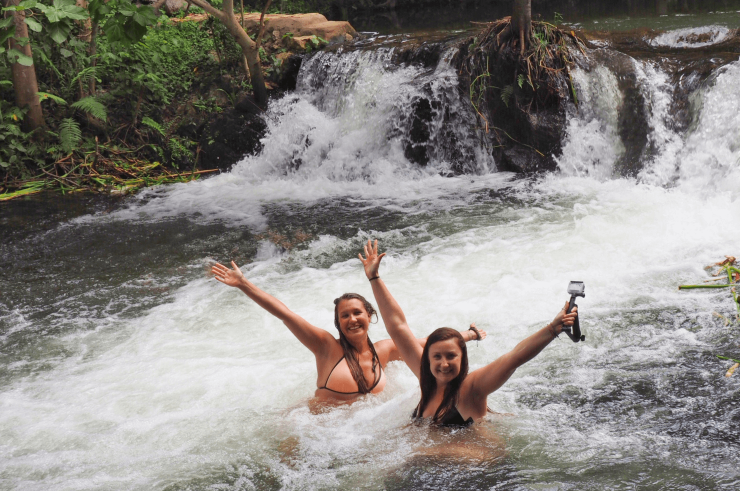
Know What You Can and Can’t Photograph
As tempting as it is to take photos of everything, taking photos of government buildings, bridges and border posts is usually illegal. So unless you want to lose your camera, keep it in your bag, or at the very least be very discreet about it. You have been warned.
Also, be very cautious when taking pictures of people. There’s a reason why I don’t have many people pictures on my blog and that’s because many people don’t like it. Or they ask for money.
It’s usually fine to take a photo of a general scene (just be careful in markets), but don’t just take a picture of a specific person without asking, that’s just rude.
Always Check the Bus Times
Always check what time the buses depart and don’t just expect to be able to get where you’re going. Some countries have night curfews so the last buses depart early.
If you need to get a connecting bus, check what time the last buses leave. For example, the other day, I was going to Lusaka in Zambia from Lilongwe in Malawi via the town of Chipata.
We left Lilongwe late and arrived at Chipata at 1pm. The last buses left for Lusaka at 12pm. So we’d just missed it. We spent an hour trying to negotiate a taxi to take us but ended up staying the night and then having to take two 7 hour bus journeys in one day to reach our final destination of Livingstone.
It’s About the Journey, Not the Destination
People travel to Africa to tick off the big bucket list experiences, like climbing Kilimanjaro in Tanzania, gorilla trekking in Uganda & Rwanda or going on safari in the Masai Mara. But often, when you look back, your best memories won’t be of those things…
They’ll be memories of that crazy bus journey you took. Or the time you met some kids by the side of the road and had a nice chat. Or the time you got covered in sardines on the bus. Or the time you got home at 7am, after dancing all night at the party to celebrate the inauguration of the new Chief of the village (seriously, I need to tell you about my Malawi trip it was so cool).
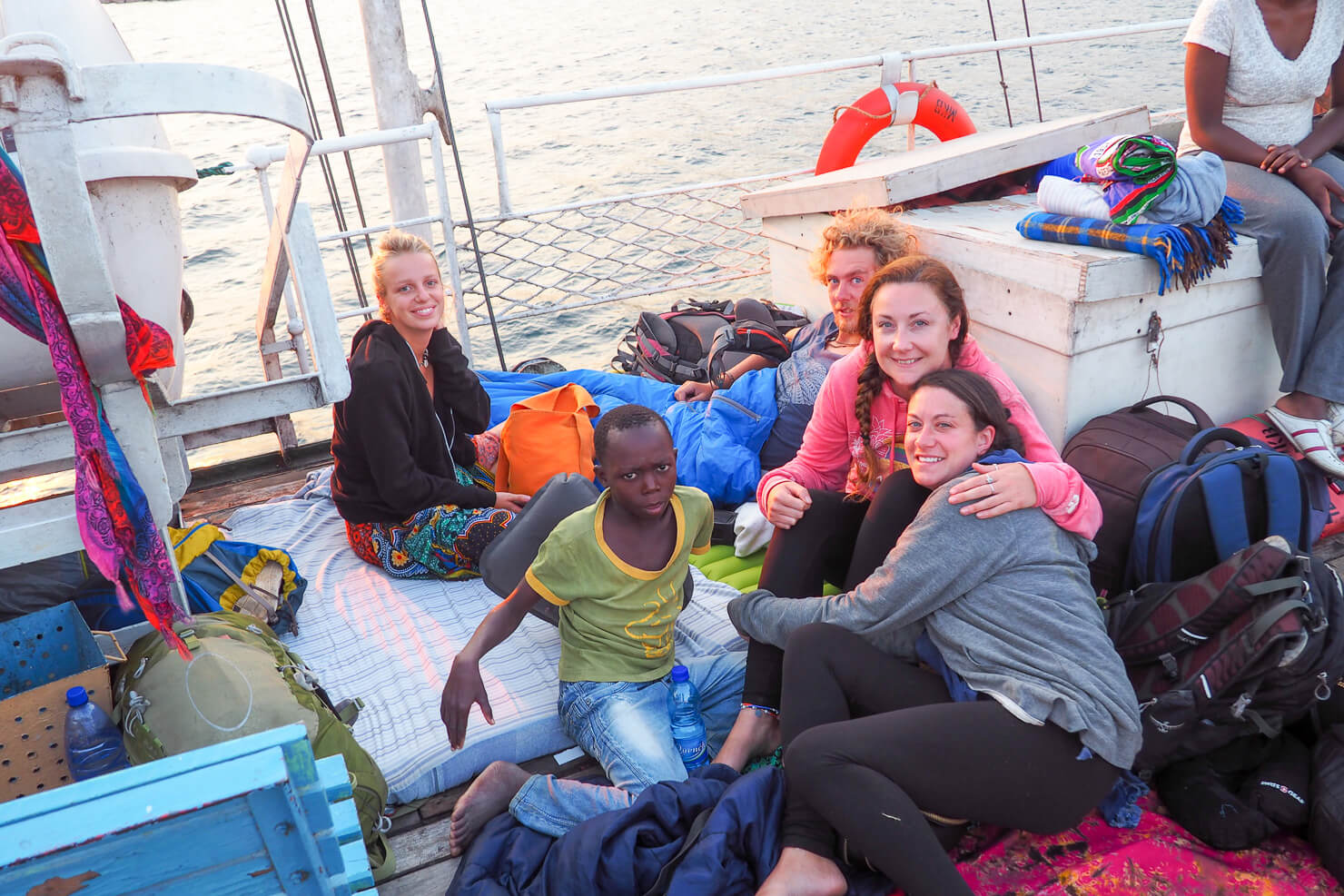
Backpacking Africa is NOT ‘Easy’
But it is amazing and easier than most people think!
Logistically speaking, it’s not difficult to get around most places (Namibia and Botswana tend to be the most difficult as public transport is scarce) and there’s always someone who can tell you how to get from A to B or help you out!
Travelling Africa can be both mentally and physically challenging. But that’s part of why we do it, right?
The last two weeks of backpacking through Malawi were two of the ‘toughest’ (ie. physically uncomfortable) backpacking weeks I’ve ever done. But they were also two of the best.
You need to prepare yourself physically and psychologically for Africa travel. Africa will wear you down and break your heart, but it will also uplift your soul, open your mind and help you to discover who you truly are.
But Every Day Will Be an Adventure
Whether you’re just wandering around town, or doing a cool activity or going out on safari, every day you travel in Africa will be an adventure.
Travelling in Africa makes you feel connected to the world and people around you like nowhere else. You will meet the most incredible people, both locals and other travellers, experience the most incredible things and have the time of your life.
It’s Probably the Best Thing You’ll Ever Do
Yes, backpacking Africa can be difficult and challenging but it is also incredibly rewarding, massively character building and a lot of fun.
One of the girls who came on my Tanzania trip earlier this year said:
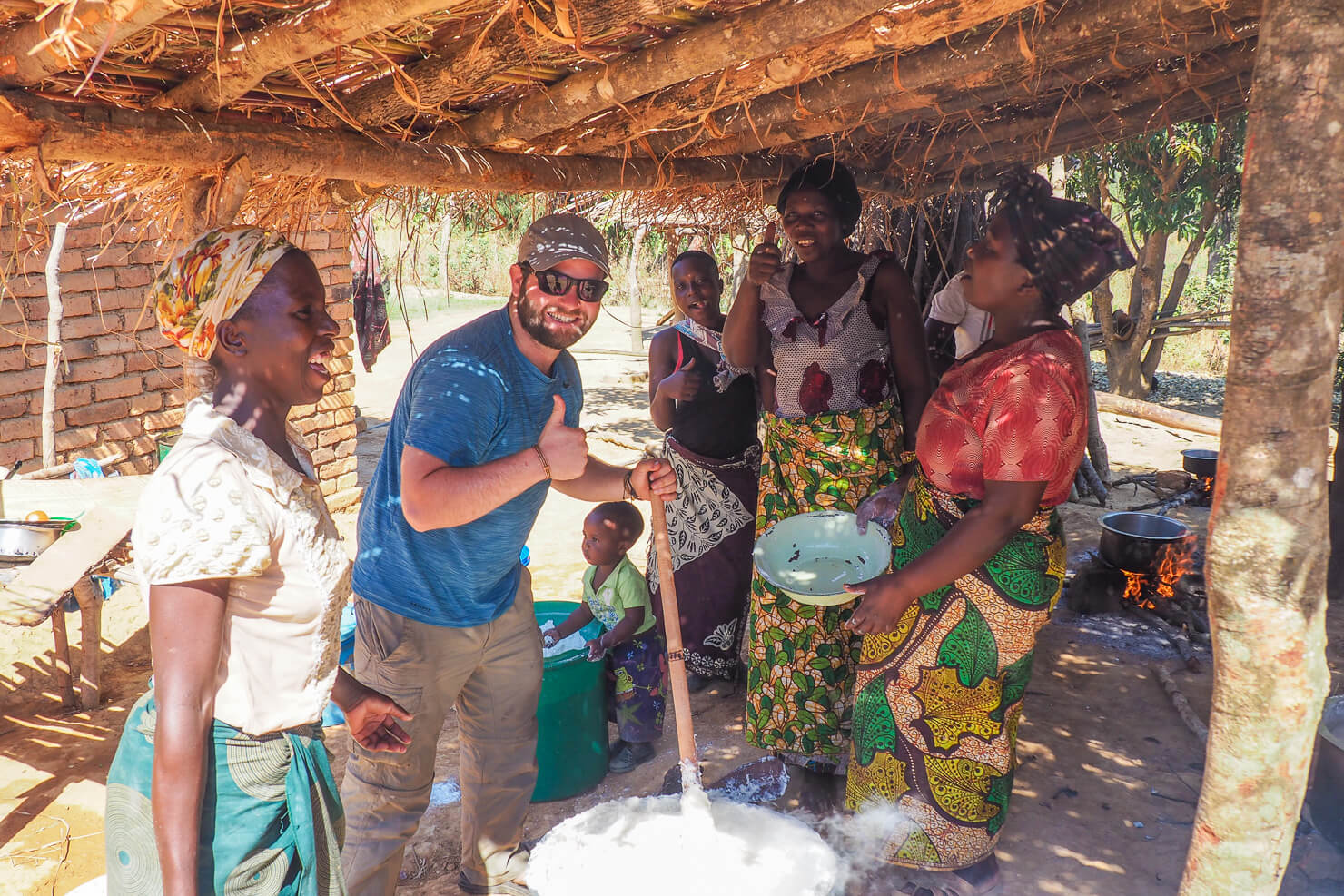
Travelling in Africa is the BEST thing I’ve ever done and made me who I am today. It changed my life. Maybe it will do the same for you…
Read More About Africa…
Please Note: Some of the links in this post are affiliate links, which will earn me a small commission at no extra cost to you. Affiliate sales help with the running costs of this site, so thank you for your support!

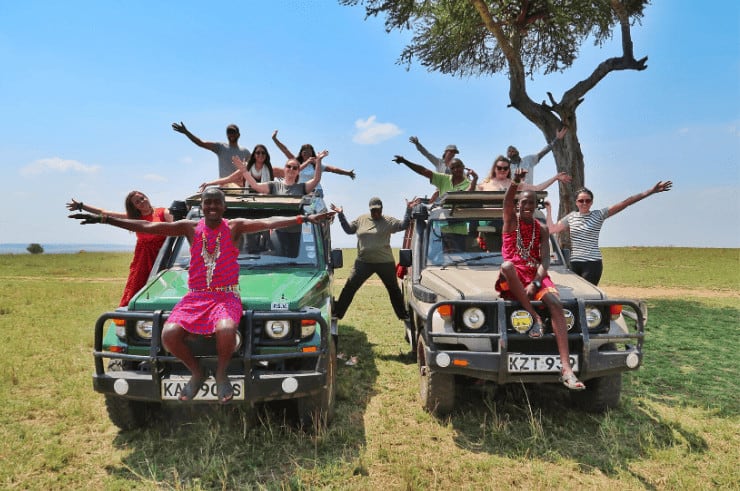
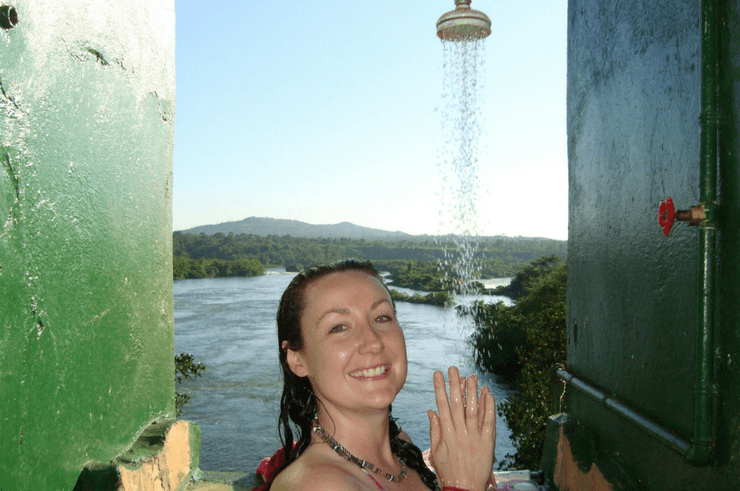
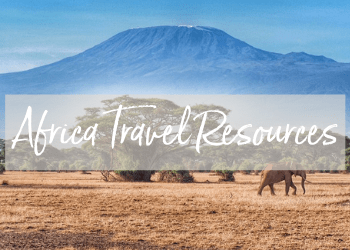
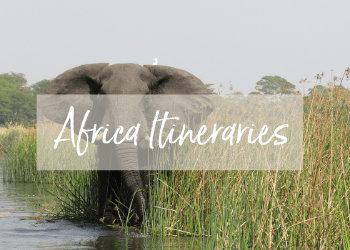
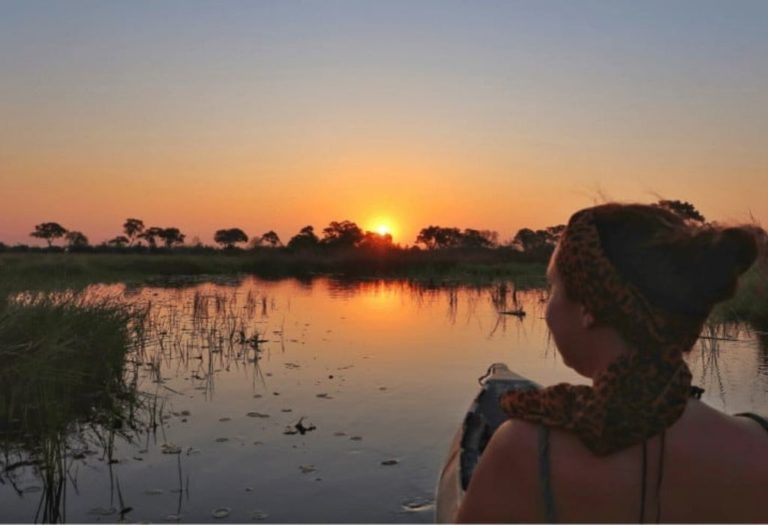
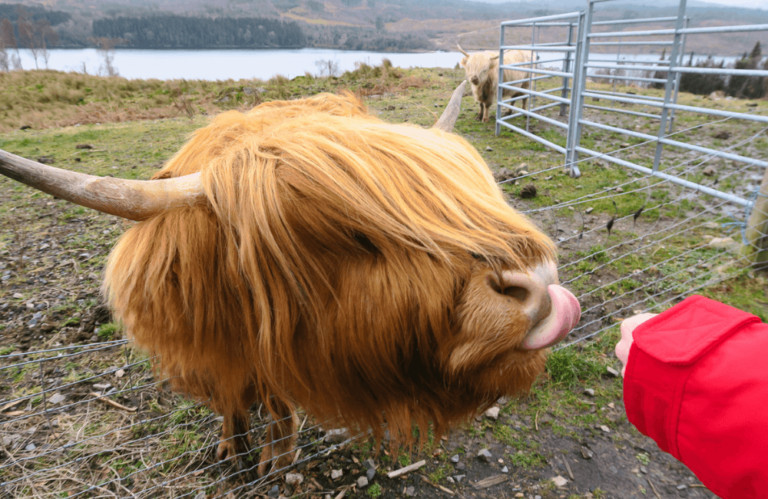
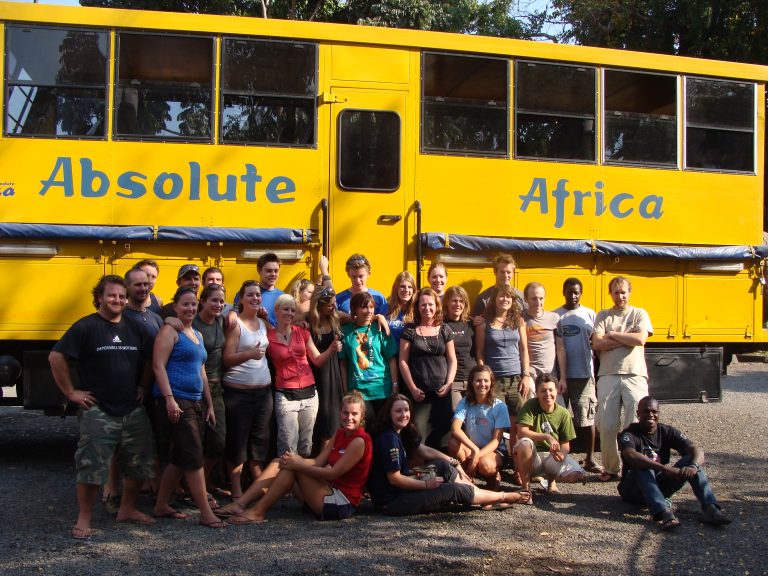
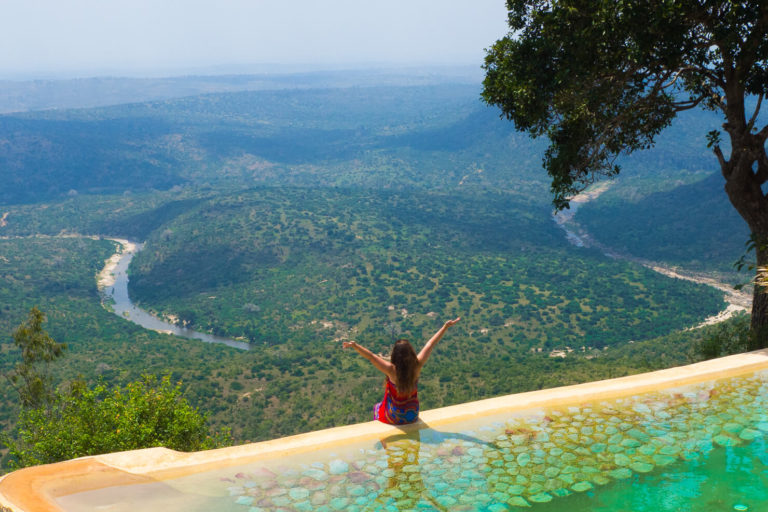
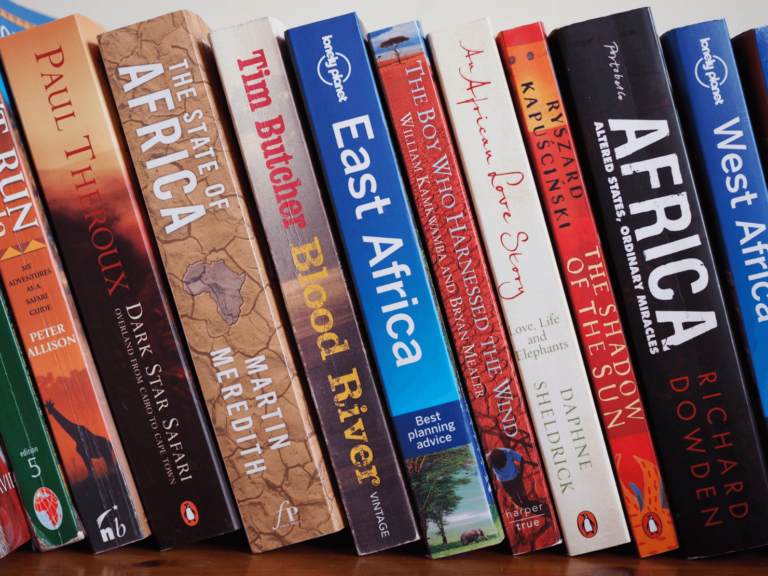
Thanks for posting this! It’s full of information! I enjoyed reading it! keep up the great work as usual!
Thank you!!!
Love this… I’ve got Africa on my mind for 2018 and I’ll be coming back to this when I’m thinking about booking. Amazing Africa tips as ever 🙂
Aw thanks Jo!!! We need to try and co-ordinate! Imagine me and you let loose in Africa! 🙂
I really enjoyed reading that! Thank you for sharing all that great information. That shot on Mount Nyiragongo is just amazing!
Thank you! Glad you enjoyed it!
Mount Nyiragongo was an awesome place to visit. Tough, but out of this world A-MAZING!!!!
Loved this one! Informative and fun. I’ve been to Joburg and that’s it. I have a lot of catching up to do. Never would’ve thought of backpacking Africa, but thanks to you, now I even might one day =)
Thank you!
Africa is a great place to backpack! You definitely should!
Thanks so much, this is super helpful! You’re totally right about the addiction… I’ve been to Africa twice and just keep adding more and more to my bucket list!
Ha ha yes it’s definitely addictive!
Wow love this blog!! I will be travelling to Malawi in July from Australia volunteering in dental. I will private msg you. Thank you for so many great tips.
Thank you so much! No worries, I look forward to hearing from you! 🙂
Great post, I enjoyed reading about these tips, I’m planning a trip to Africa next year and it will be helpful.
Great! Glad you found it useful and hope you have an amazing trip!
I’m going to disagree with the premise that taking a photo of someone without asking is rude. I totally disagree, unless you’re right in their face like the paparazzi. I’m speaking of what is right/wrong, not laws, as I’m sure African laws are different than USA laws. To me, though, anything in plain view of your eyes, ANYTHING, is fair game for taking photos, again so long as you’re not like the paparazzi in how you do it.
This thing of being told you need to ask permission to take a photo of someone seems to be a recent thing, I don’t recall hearing about this so much 10 or 15 years ago, and no, the Internet really isn’t anything to be afraid of. When I was younger film constrained me, now I’ve been unleashed via digital, why should I have to keep restraining myself like it’s still the 80s’?
Hi Larry,
As I said, it’s fine to take pictures of a general scene, but I would be wary of taking pictures of a specific person (someone you don’t know, say in a market or something) without their permission. In many parts of Africa, it is seen as rude. Some people are fine with it, some aren’t. I’ve asked plenty of people if I can take their picture and they say no, so I respect that. I’ve often taken a picture of a general scene and people turn away and hide their faces.
This is especially common in places where they aren’t really used to tourists. I asked a Tanzanian friend once, why people didn’t like their photo taken. He said it was because they thought we would either a) laugh at them or b) sell the pictures and make money.
I get your point, I’m from the UK, where most people have smartphones, everyone is taking pictures and no-one cares, everyone is online. But that’s not the case everywhere in Africa yet, and probably many other parts of the world. A lot of people in Africa are starting to get online now and do have Facebook etc and things are definitely changing. But a lot of people still aren’t online yet and don’t understand social media.
The world was a different place 10 or 15 years ago. You didn’t really have to worry about your face being splashed all over the internet.
This has nothing to do with ‘restraining’ you or ‘right and wrong’, but being aware of your surroundings and the situation you’re in and respecting the local people whose country you are in.
Also as I mention, people often ask for (in some cases demand) money and you may come up against a situation that is very uncomfortable. So I wanted to warn people about that.
And yes, there are different laws in African countries regarding what you can and can’t photograph, than there are in the US, of course. Government building, bridges and borders are usually no photo zones.
Out of curiosity, have you been to Africa? What was your experience of photographing people?
Totally agree with all the things – especially the African massage!! Always enjoy yor blogs – can I ask how you get your Pinterest images to link. Is it via a particular plugin? Thanks!
Thank you Rose! 🙂
I use jQuery Pin It Button for Images
You worked hard to guide people before travelling in Africa and explain all needs and real problems a man face during journey. You explained everything from food to toilet including weather , dust of Africa, Mosquitos and other insects, uncomfortably of travelling, transport’s condition, Poverty of Africa, effects of dust , weather and insects on skin, loneliness. In fact it is very good working style and please carries on good working.
Wow! This has been so very helpful! I will be studying abroad this summer for two months in Tanzania and Zanzibar so I’ve been researching and came across your blog. You’ve inspired me to continue my travels after my program is over, Thank you for sharing!
A well explained guide with very useful details. Thanks for having the time to compile such a great piece of content. This would be very useful for all travelers like me.
Such a great article. Thanks for posting this!
Great article. Thank you for taking the (long) time needed to write it.
Only thing disspointing is that I would not be able to afford most of the “organized things-to-do” because they sound terribly expensive.
Only information I am missing is about safety and security: pick-pockets, bandits and so on. I met once one Japanese traveller who was left in underware wearing a t-shirt, aparently some guys came to him with machetes and took (literarely) even his pants.
I´ll be travelling with camera gear and I am concerned about this subject, specially as budget back-packer who will not be traveling in a isolated bubble with rich saffari-goers.
my dream is to travel all of africa and to go to every country. is that possible? Can you take a public bus from country to country?
Hi Brad, yes you can get around most places by bus. Not all cross borders but you can usually get one too the border and pick up on the other side.
Wow great post Helen! This has been so very helpful! I will be studying abroad this summer for two months in Tanzania and Zanzibar so I’ve been researching and came across your blog. You’ve inspired me to continue my travels after my program is over. Thank you for sharing!
Regards,
Kai
Dear Halen,
First of all, you are an amazing writer with alot of helpful information about backpacking in Africa. Thank you so much for sharing.
Anyway, I always want to backpack Africa by myself. I am thinking about 6months to a year, perhaps volunteer for workaway to learn about various cultures .
I have few questions: What country do you recommend to begin and end the journey, any backpacking route? What types of vaccines do I need? Have you experienced or heard about any robbery?
Danny
Hi Danny,
You could start in Nairobi or Cape Tow – they are both popular places to start and finish. For routes, please check out my itinerary posts.
In terms of vaccinations, I’d advise speaking to a doctor or travel clinic.
Yes, robberies do happen so you should try to be pretty vigilant but I wouldn’t let it deter you from travelling! 🙂
Hey Helen! This was such a joy to read, I’ve always wanted to explore Southern Africa!! Nonetheless, if you’ve considered West Africa I’d suggest Ghana, I lived there for 13 years and the people are so friendly and the coast is beautiful. It’s quite metropolitan but there is so much to see and the rural north is stunning!
Brilliant post – and blog! I’ve done lots of backpacking and travelling but apart from Morocco, I’ve not explored Africa and I’ve wanted to for so long now! I’m now starting to plan a trip and this blog is helping me so much, especially as someone who is notoriously known for being a solo traveller. I’ve done some research but your blog is really proving how many places there are to visit and how much stuff there is to do in Africa!
Thanks so much Helena! Enjoy your trip!
Nice blog. Thanks for sharing..
Hi Helen
Thank you very much for your fantastic recommendations! I have a question regarding the transit flight, maybe you can help me.
I will fly to South Africa and want to travel along the east cost to the north. As I have a lot of time I have no clue where I will be ending and would like to buy a one way ticket. However, South Africa wants to see a return ticket, so I thought to buy a fake one or buy a ticket which I can cancel within 48 hours. How is it in other coutries like Mozambique, Zambia, Malawi and so on. Can you cross the boarder without a return ticket?
It would be great to have some information.
Bye Guyslaine
Hi Guyslaine,
I’ve never had an issue with needing an onward ticket from the other countries you mention.
Helen
Dear Helen,
Thank you so much for this information! My husband and I are both Colombian and we have the travel bug! We have been dreaming about Africa for so long and finally we are ready to buy our tickets and start discovering the mother continent! Your blog has been for us a lot of inspiration and guide and I would love to contact you directly, to see how could we work together. We are also travel bloggers (when we are on the road, since we do not travel all the time on a full-time basis. Anyways, our website is http://www.vamossomewhere.com and we really hope hearing from you for further guidance! Best regards, Lina and Mauro
my dream is to travel all of africa and to go to every country. is that possible? Can you take a public bus from country to country?
This article inspire me to backpack Africa! I recently stumbled across this blog and love all of the Africa content. Cheers!
Hi,
I really wanna thank you, your blog give me a great idea how to travel africa. I was just wondering have you done any injections when you first leave to africa? Yellow fever or anything else. I am planning to stay around 1 year in south africa and maybe another year up north.
Thanks a lot
You a great !
Hi Helen! Wow, you are really a world traveller. In recent years I feel I definitely should visit Africa. It’s interesting what you wrote- that it gets cold there. I always thought Africa was always very very hot. When I go I will be sure to bring some warm clothes. Thanks alot! Alex